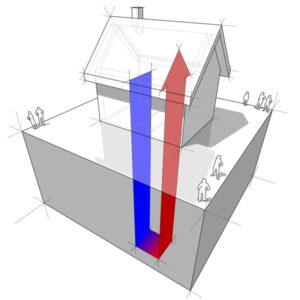We’re proud to offer geothermal HVAC solutions for local homeowners. We install new systems, provide repairs and maintenance, and replace geothermal systems. If you’re considering going with a geothermal heat pump in Hamilton, OH for your year-round home comfort, we can help you find the best type of system and loop configuration to match your property. You might have thought that geothermal energy wasn’t in your reach, but you may be surprised!
We recommend geothermal systems for a range of reasons: they have excellent environmental benefits, long service lives, low maintenance requirements, quiet operation, and general reliability. But the benefits that attract most people’s attention to these systems is their potential for energy savings and a short payback period.
The General Efficiency of Geothermal Heat Pumps
According to the US Department of Energy, geothermal (“ground source”) heat pumps have significantly improved efficiency compared to standard (“air source”) heat pumps: “Geothermal systems can reduce energy consumption by approximately 25% to 50% compared to air source heat pump systems. Geothermal heat pumps reach high efficiencies (300%–600%) on the coldest of winter nights.” When you consider the long service life of ground source heat pumps (the ground loops can last for more than 50 years), you’ll see how much one of these HVAC systems can save you in the long run.
What makes a geothermal heat pump so much more efficient than many of the alternatives? We’ll explain below.
Harnessing the Heat of the Earth
The secret of geothermal energy efficiency is the stable temperatures of the ground approximately ten feet below the frost line, which is where the ground loops of the system are buried. The heat emanating from the Earth’s core at this depth is unaffected by temperature conditions above ground. At around ten feet deep, the ground temperature remains stable at approximately 45°F. Although this sounds a touch cold, it’s more than warm enough for the ground loops of a heat pump to draw on sufficient thermal energy to provide heat to a house without losing any of its energy efficiency. Loss of efficiency in extreme cold temperatures is a problem air source heat pumps can encounter.
This stable temperature is beneficial for a geothermal heat pump when it shifts to cooling mode as well. When in cooling mode, a geothermal heat pump removes heat from the inside of the house and deposits it into the ground. The stable 45°F is a perfect temperature for this. The heat pump won’t have to struggle with pushing heat outdoors into 90°F weather conditions.
According to the DOE, the average payback period for a geothermal heat pump is between 5 to 10 years, with an expected service life for the indoor components of 20 years and 50 years for the ground loops. This means most homes can enjoy 10 to 15 years of energy savings, and replacing the indoor components after 20 years is a far less expensive endeavor than the initial installation cost for the whole geothermal system.
Call Bartels Heating & Cooling “For a Comfortable Way of Life”! We offer full geothermal heat pump services.

